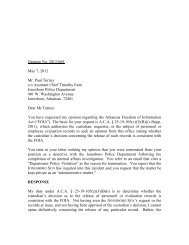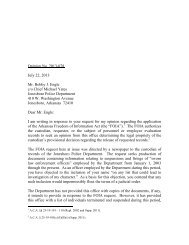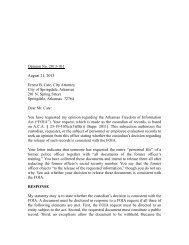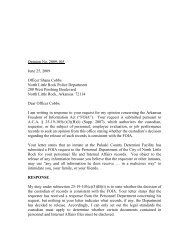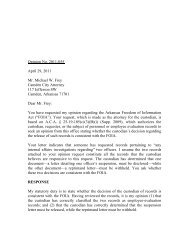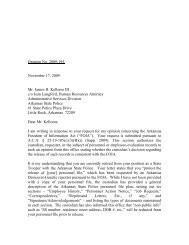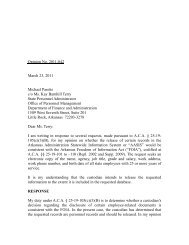Opinion No. 2008-167 October 8, 2008 Mr. H. Ray Hodnett Attorney ...
Opinion No. 2008-167 October 8, 2008 Mr. H. Ray Hodnett Attorney ...
Opinion No. 2008-167 October 8, 2008 Mr. H. Ray Hodnett Attorney ...
You also want an ePaper? Increase the reach of your titles
YUMPU automatically turns print PDFs into web optimized ePapers that Google loves.
<strong>Mr</strong>. H. <strong>Ray</strong> <strong>Hodnett</strong><br />
<strong>Attorney</strong> at Law<br />
<strong>Opinion</strong> <strong>No</strong>. <strong>2008</strong>-<strong>167</strong><br />
Page 2<br />
RESPONSE<br />
My statutory duty under A.C.A. § 25-19-105(c)(3)(B) (Supp. 2007) is to<br />
determine whether the decision of the custodian of records as to the release of<br />
“personnel or evaluation records” is consistent with the FOIA. <strong>No</strong>t having seen<br />
the records at issue or been apprised of the custodian’s decision, I cannot opine<br />
definitively concerning the release of any particular record. Rather, the discussion<br />
must be limited to the applicable tests for the disclosure of employee-related<br />
records. [2]<br />
I should initially note, however, that your statement as to the documents being<br />
“part of an on-going legal process” is in my opinion not dispositive of whether<br />
they are subject to disclosure under the FOIA. This statement may suggest that<br />
you consider the records to be “employee evaluation or job performance records”<br />
covered by A.C.A. § 25-19-105(c)(1); and that you believe there has been no final<br />
administrative decision to terminate the employee, given that the employee may<br />
appeal to circuit court. See n. 1, supra. As explained further herein, “employee<br />
evaluation or job performance records” are exempt from public disclosure under<br />
the FOIA if there has been no “final administrative resolution” of a suspension or<br />
termination. A.C.A. § 25-19-105(c)(1). However, as noted by two leading<br />
commentators on the FOIA:<br />
The term “final administrative resolution” refers to the final<br />
decision-making step taken by the employing entity, regardless of the<br />
bureaucratic level at which the decision is made. For example, in<br />
some cases the matter might be resolved by a department head,<br />
while in others the employee may decide to seek review by the top<br />
agency official…. If no such review is sought, however, the initial<br />
decision is "final" for purposes of this provision.<br />
J. Watkins and R. Peltz, THE ARKANSAS FREEDOM OF INFORMATION ACT (m & m<br />
press, 4 th ed. 2004) at 202 (citing Op. Att’y Gen. <strong>No</strong>s. 98-006, 95-204, 94-306, 91-<br />
003; and noting: “That there has been no judicial review is immaterial. Ark. Op.<br />
Att’y Gen. <strong>No</strong>. 95-204.” (Emphasis added)).<br />
[2]<br />
Records maintained with regard to the employment of a public employee typically comprise both<br />
“employee evaluation/job performance records” and “personnel records” within the meaning of the FOIA;<br />
and it is important for the custodian of the records to classify the records correctly because, as discussed<br />
further herein, the standards for releasing these two types of records differ.
<strong>Mr</strong>. H. <strong>Ray</strong> <strong>Hodnett</strong><br />
<strong>Attorney</strong> at Law<br />
<strong>Opinion</strong> <strong>No</strong>. <strong>2008</strong>-<strong>167</strong><br />
Page 3<br />
My immediate predecessor further commented in this regard: “The fact that an<br />
employee may continue to dispute a ‘final administrative resolution’ of a<br />
suspension or termination proceeding does not make the ‘administrative’<br />
resolution any less final for purposes of the release of records under the FOIA.”<br />
Op. Att’y Gen. 2005-279 (citing Op. Att’y Gen. 1995-204). See also Op. Att’y<br />
Gen. 2005-181 (“The determination whether there has been a ‘final administrative<br />
resolution’ for purposes of A.C.A. § 25-19-105(c)(1) … does not depend, in my<br />
estimation, upon the certainty that all procedural requirements were met such that<br />
the decision made in an administrative proceeding will withstand judicial review.<br />
The focus, instead, is upon exhaustion of administrative remedies.”).<br />
Accordingly, if the board upheld the termination recommendation in this instance,<br />
it seems clear that there has been a “final administration resolution” of the<br />
termination. The question then turns to whether the particular records at issue in<br />
fact constitute “employee evaluation or job performance records,” or whether any<br />
other specific exemptions may apply. The FOIA provides for the disclosure upon<br />
request of certain “public records,” which the Arkansas Code defines as follows:<br />
“Public records” means writings, recorded sounds, films, tapes,<br />
electronic or computer-based information, or data compilations in<br />
any medium, required by law to be kept or otherwise kept, and<br />
which constitute a record of the performance or lack of performance<br />
of official functions which are or should be carried out by a public<br />
official or employee, a governmental agency, or any other agency<br />
wholly or partially supported by public funds or expending public<br />
funds. All records maintained in public offices or by public<br />
employees within the scope of their employment shall be presumed<br />
to be public records.<br />
A.C.A. § 25-19-105(5)(A) (Supp. 2007).<br />
Given that the records apparently pertain to the disciplining proceeding of a public<br />
school employee, and are kept by the school district, they are presumptively<br />
“public records” under this definition. As predecessor noted in Op. Att’y Gen.<br />
<strong>No</strong>. 99-305, “[i]f records fit within the definition of ‘public records’ . . ., they are<br />
open to public inspection and copying under the FOIA except to the extent they<br />
are covered by a specific exemption in that Act or some other pertinent law.” Id.<br />
at 2.
<strong>Mr</strong>. H. <strong>Ray</strong> <strong>Hodnett</strong><br />
<strong>Attorney</strong> at Law<br />
<strong>Opinion</strong> <strong>No</strong>. <strong>2008</strong>-<strong>167</strong><br />
Page 4<br />
Based upon the limited information before me, it appears that the most pertinent<br />
exemption in this instance may be the one noted above for “employee evaluation<br />
or job performance records.” A.C.A. § 25-19-105(c)(1). The FOIA does not<br />
define “employee evaluation or job performance records,” nor has this phrase been<br />
construed by the Arkansas Supreme Court. This office has opined, however, that<br />
documents such as written reprimands and letters of caution, documents<br />
supporting a recommendation for suspension or termination, letters related to<br />
promotions and demotions, and records that were generated by or at the behest of<br />
the employer as part of an investigation of allegations of misconduct and that<br />
detail incidents that gave rise to such allegations generally fall within the category<br />
of “employee evaluations or job performance records.” See, e.g., Op. Att’y Gen.<br />
<strong>No</strong>s. 2006-035, 2003-078, 2001-203, 99-147, 93-105, 93-055, 92-231, and 91-<br />
324.<br />
The record must have been created for the purpose of evaluating an employee.<br />
See, e.g., Op. Att’y Gen. <strong>No</strong>s. 2006-038 and 2004-012. The exemption promotes<br />
candor in a supervisor’s evaluation of an employee’s performance with a view<br />
toward correcting any deficiencies. See J. Watkins & R. Peltz, THE ARKANSAS<br />
FREEDOM OF INFORMATION ACT (m & m Press, 4th ed. 2004) at 196. It has<br />
therefore been opined that “[d]ocuments not created in the evaluation process do<br />
not come within the rationale behind the 25-19-105(c)(1) exemption.” See Op.<br />
Att’y Gen. 2005-267, citing Op. Att’y Gen. 2005-094.<br />
I lack sufficient information to determine whether the particular documents at<br />
issue are evaluation or job performance records under this exemption. The<br />
custodian must make that initial determination, perhaps looking to these opinions<br />
for guidance. If the documents fall into this category, then they are releasable only<br />
if various conditions have been met. Subsection 25-19-105(c)(1) of the Code<br />
provides in pertinent part:<br />
[A]ll employee evaluation or job performance records, including<br />
preliminary notes and other materials, shall be open to public<br />
inspection only upon final administrative resolution of any<br />
suspension or termination proceeding at which the records form a<br />
basis for the decision to suspend or terminate the employee and if<br />
there is a compelling public interest in their disclosure.<br />
Employee evaluation or job performance records cannot be released unless each<br />
prong of this test has been met: 1) There has been a final administrative resolution<br />
of any suspension or termination proceeding; 2) The records in question formed a
<strong>Mr</strong>. H. <strong>Ray</strong> <strong>Hodnett</strong><br />
<strong>Attorney</strong> at Law<br />
<strong>Opinion</strong> <strong>No</strong>. <strong>2008</strong>-<strong>167</strong><br />
Page 5<br />
basis for the decision made in that proceeding to suspend or terminate the<br />
employee; and 3) There is a compelling public interest in the disclosure of the<br />
records in question. As indicated above, it appears that the first, threshold<br />
requirement has been met. The two remaining factual predicates are that the<br />
records “formed a basis” for the termination and that there be a compelling public<br />
interest” in disclosure. The issue of whether requested records “formed a basis”<br />
for termination is generally interpreted to mean that the records in question reflect<br />
or detail the incidents or conduct that led to the termination. Op. Att’y Gen. <strong>2008</strong>-<br />
065 (and opinions cited therein). This is a question of fact to be determined by the<br />
records’ custodian, who can presumably inquire of those who made the decision.<br />
The final prong of the test for release of employee evaluation or job performance<br />
records is that there be a “compelling public interest” in their disclosure. The<br />
FOIA at no point defines the phrase “compelling public interest’" as used in the<br />
final prong of the A.C.A. § 25-19-105(c)(1) test. However, the following<br />
guidelines have been offered by two commentators:<br />
[I]t seems that the following factors should be considered in<br />
determining whether a compelling public interest is present: (1) the<br />
nature of the infraction that led to suspension or termination, with<br />
particular concern as to whether violations of the public trust or<br />
gross incompetence are involved; (2) the existence of a public<br />
controversy related to the agency and its employees; and (3) the<br />
employee's position within the agency. In short, a general interest in<br />
the performance of public employees should not be considered<br />
compelling, for that concern is, at least theoretically, always present.<br />
However, a link between a given public controversy, an agency<br />
associated with the controversy in a specific way, and an employee<br />
within the agency who commits a serious breach of public trust<br />
should be sufficient to satisfy the “compelling public interest”<br />
requirement.<br />
THE ARKANSAS FREEDOM OF INFORMATION ACT, supra at 207 (footnotes<br />
omitted).<br />
If the documents in question do not constitute employee evaluation or job<br />
performance records, they must be evaluated by the custodian with an eye to<br />
determining whether any other specific exemptions may apply. The exemption for<br />
“personnel records” should be noted in this regard. The FOIA does not define the<br />
term “personnel records,” but this office has consistently taken the position that
<strong>Mr</strong>. H. <strong>Ray</strong> <strong>Hodnett</strong><br />
<strong>Attorney</strong> at Law<br />
<strong>Opinion</strong> <strong>No</strong>. <strong>2008</strong>-<strong>167</strong><br />
Page 6<br />
“personnel records” are all records, other than employee evaluation/job<br />
performance records, that pertain to individual employees, former employees or<br />
successful job applicants. See, e.g., Op. Att’y Gen. 2004-212. Such records are<br />
exempt only to the extent their disclosure would constitute a “clearly unwarranted<br />
invasion of personal privacy.” A.C.A. § 25-19-105(b)(12) (Supp. 2007). The<br />
FOIA likewise does not define the phrase “clearly unwarranted invasion of<br />
personal privacy.” However, the Arkansas Supreme Court has construed the<br />
phrase, applying a balancing test, weighing the interest of the public in accessing<br />
the records against the individual’s interest in keeping the records private. See<br />
Young v. Rice, 308 Ark. 593, 826 S.W.2d 252 (1992). If the public’s interest<br />
outweighs the individual’s interest, the release of the records will not constitute a<br />
“clearly unwarranted invasion of personal privacy.” If there is little public interest<br />
in the information, the privacy interest will prevail if it is not insubstantial. Stilley<br />
v. McBride, 332 Ark. 306, 965 S.W.2d 125 (1998). The question of whether the<br />
release of any particular personnel record would constitute a clearly unwarranted<br />
invasion of personal privacy is always a question of fact to be made by the<br />
custodian of records. See, e.g., Op. Att’y Gen. <strong>2008</strong>-033 (and opinions cited<br />
therein).<br />
Given that I am not a finder of fact and have not been provided any of the<br />
documents at issue, I am unable to definitively opine regarding which documents,<br />
if any, are subject to disclosure. The foregoing will hopefully be of assistance,<br />
however, in addressing particular records.<br />
Deputy <strong>Attorney</strong> General Elisabeth A. Walker prepared the foregoing opinion,<br />
which I hereby approve.<br />
Sincerely,<br />
DUSTIN McDANIEL<br />
<strong>Attorney</strong> General<br />
DM:EAW/cyh



